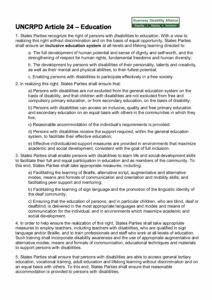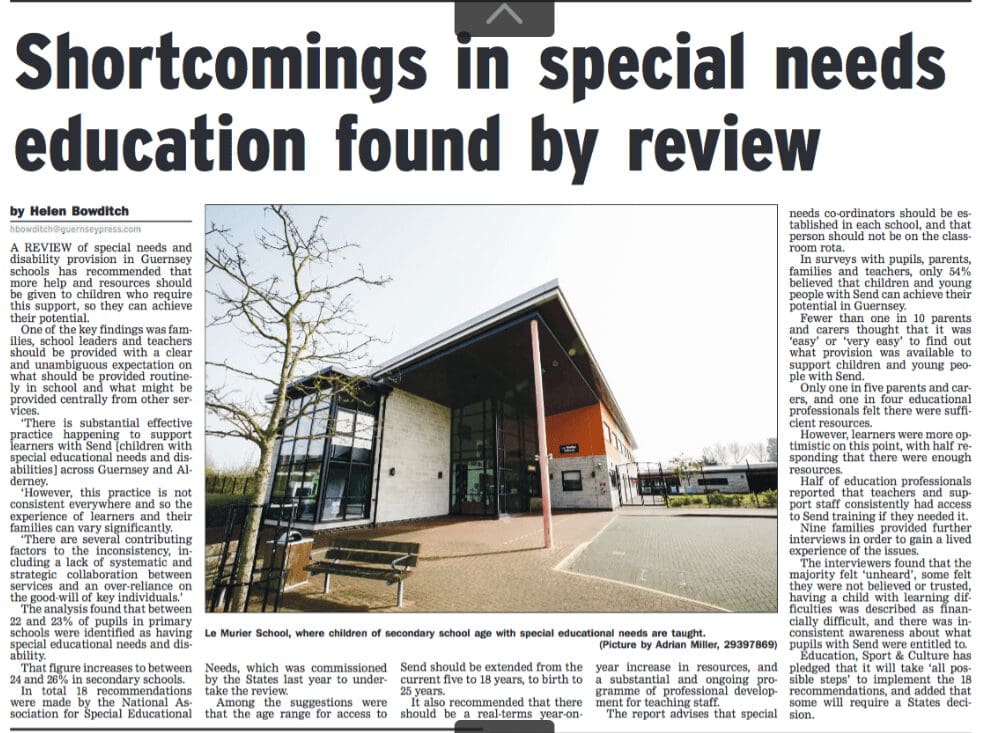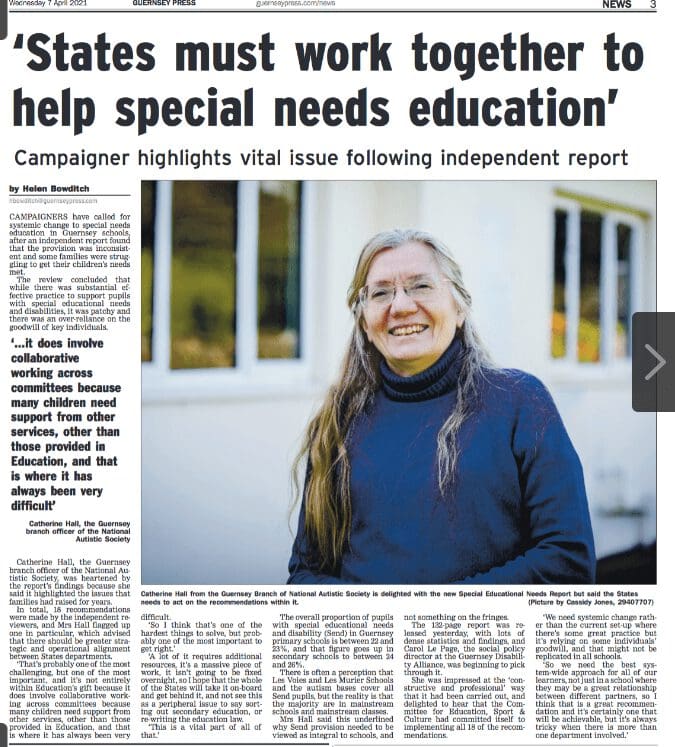April 28, 2021
SEND Review, commissioned by the previous Committee forEducation, Sport & Culture, was carried out by nasen (National Association for Special Educational Needs)
The States have issued a media release on the Special Education Needs and Disability (SEND) review see SEND review. The review, undertaken by National Association for Special Educational Needs (nasen), was commissioned by the by the last Committee for Education Sports and Culture (ESC) but delayed due to COVID. The full report can be found here.
The GDA executive were invited to a meeting with and Deputy Millie Dudley-Owen, President Education Sports and Culture and Nick Hynes, Head of Inclusion and Services for Children & Schools on 31st March 2021 ahead of the release of the review. A summary of the reports findings were well received at that meeting.
The GDA ran an open meeting for all members and people interested in the SEND review on Wednesday 28th April at Les Cotils.
Resources
- You can see the presentations here: Presentation of SEND 28-04-2021
- The link to the UNCRPD Article 24 – Education is here
It is hoped that a further meeting can be arranged with Education to go through any questions or concerns raised at the initial meeting and to understand what the ESCs proposed action plan will be for implementation of the 18 recommendations in the review.



STATES OF GUERNSEY MEDIA RELEASE
Tuesday 06 April 2021
A wide-ranging review of Special Educational Needs and Disability provision in Guernsey and Alderney has found that there is some excellent, inclusive practice in place in fully States-funded schools and made recommendations to help ensure this is extended to all learners, all of the time.
The SEND Review, commissioned by the previous Committee for Education, Sport & Culture, was carried out by nasen (National Association for Special Educational Needs) – a charitable membership organisation that exists to support and champion those working with, and for, children and young people with SEND and learning differences. The Review identified that there is substantial effective practice happening to support learners with SEND across Guernsey and Alderney. However, this practice is not always consistent everywhere and so the experience of learners and their families can sometimes vary.
There are 18 recommendations arising from the SEND Review and the Committee for Education, Sport & Culture is committed to taking all possible steps to implement them. However, the Committee is conscious that some recommendations will require a States-wide approach and has already begun discussions with other Committees to agree how best to ensure progress is made.
There were 18 recommendations in total, including that:
- Every school should have a full-time SEND co-ordinator (SENCO) who does not have specific classroom teaching responsibilities. Currently, every school has a SENCO but time allocated to carry out the role of SENCO is sometimes limited due to teaching responsibilities. This recommendation will bring schools in Guernsey and Alderney in line with their UK counterparts.
- There should be further and consistent development of good, high quality inclusive environments across all schools by setting out a ‘universal SEND offer’ that provides a clear and unambiguous expectation of ‘ordinarily-available provision’ in schools.
- The age-range for access to SEND provision should be expanded from 5-18 to 0-25. Introducing targeted strategies to support both the early identification of SEND and also ensure preparation for adulthood.
- Consideration should be given to the introduction of a real-terms year-on-year increase to the overall level of resource for SEND and inclusion aligned to the raised expectations of universal provision and the broadening of provision to include learners with SEND from 0-25.
- There should be greater strategic and operational alignment between Education and Health and Social Care services. Where appropriate, teams should be co-located and budgets should be pooled to improve efficiency and to improve the experience of families.
The review, which was agreed by the States in September 2019 and began in early 2020, was designed to identify good practice and also inform the evolution of provision, identifying opportunities that will support the on-going development of an educationally inclusive culture across the Bailiwick.
Deputy Andrea Dudley-Owen, President of the Committee for Education, Sport & Culture, said:
‘The Committee is grateful for the work nasen has carried out. We inherited this work and it has been incredibly useful for the Committee as we develop our strategic direction for the entire education ecosystem. We knew this report was coming and this is the kind of work we have been referring to when trying to explain the complexities of running an education system and how the Committee cannot, and will not, work and make decisions in isolation.
‘The SEND Review has provided an opportunity for the Bailiwick to benefit from a suitably objective evaluation of current and future SEND provision. By exploring the shape and quality of existing SEND provision and practice across the full age and ability range, the SEND Review has provided an evaluation of the Bailiwick’s effectiveness in identifying children and young people with SEND, meeting the needs of those children and young people with SEND, and securing good outcomes for children and young people who have SEND.
‘It is clear there is a huge amount of good work already being done in this area, but it is also clear we need to do more. In particular, to make sure that where there is quality provision it is delivered consistently and becomes the norm across all of our settings.
‘We are committed to delivering on nasen’s recommendations and will progress those that are within the Committee’s gift. But it is clear from the recommendations that this will require a States-wide approach in many areas and we have sought – and have already received – support from our colleagues in other Committees such as Policy & Resources where implementing recommendations will clearly have an impact on our budget and also from Health & Social Care, where joint working between these two areas is so essential to outcomes and the experience of our children, young people and adults with additional needs.’
Deputy Peter Ferbrache, President of the Policy & Resources Committee, said:
‘Our Committee had a very productive meeting with the Committee for Education, Sport & Culture about this review and it is clear that there is both very good work being undertaken to support SEND students and a need for further developments to ensure that no student is left behind through a lack of support. I know the Committee for Education, Sport & Culture is currently looking at decisions it can make to free up additional resources. This is crucial as it’s clear to everyone that the States does not have a magic money tree, but the Policy & Resources Committee will also continue working closely with our colleagues in ESC to examine what we can do to support them ensure all reasonable actions are taken to further improve this vital provision.’
Professor Adam Boddison, Chief Executive of nasen (National Association for Special Educational Needs), said:
‘My team and I were delighted to have the opportunity to lead the SEND Review and we thank the many learners, families and other stakeholders who we met, and who participated in this review. It is quite clear that there is already some excellent, inclusive practice in place and we hope our recommendations help to ensure this can now be extended to all learners, all of the time.’
Catherine Hall, the education representative of the Guernsey Disability Alliance, said:
‘We see this report as very positive. It clearly recognises that action needs to be taken on many of the issues we’ve previously highlighted. We’re pleased with the independence and high quality of this report and reassured that the Committee for Education, Sport & Culture accepts it and will act upon it.’
The Guernsey and Alderney SEND Review can be read in full at www.gov.gg/publications .

